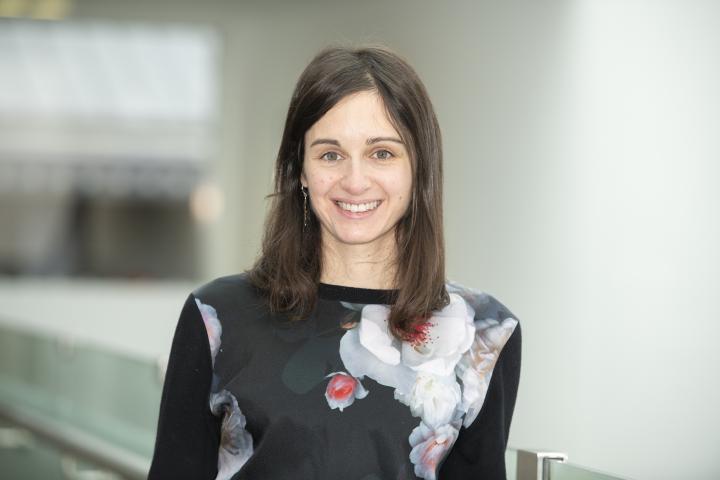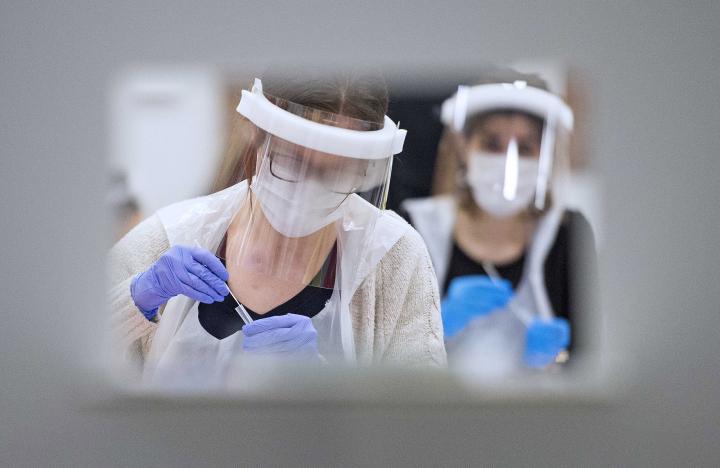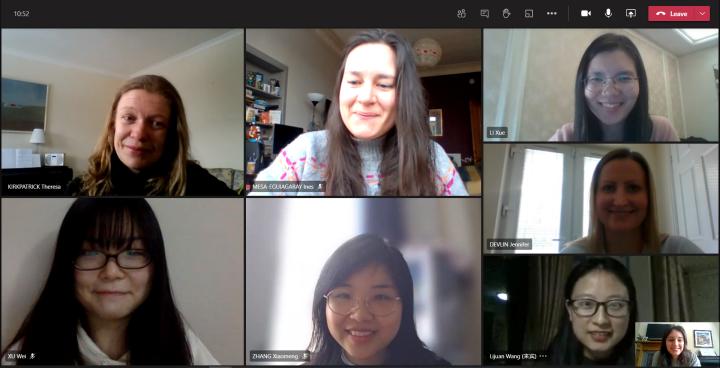A model of health
When it comes to applying modelling to improve global health, Professor Evropi Theodoratou is an expert.
Finding new methods to help diagnose and treat disease is vital in creating strong systems that protect the health of the population.
As Personal Chair of Cancer Epidemiology and Global Health, Professor Theodoratou's three main areas of research in cancer, genetic epidemiology and evidence reviews have drawn her towards projects that have benefitted patients around the world.
She has helped identify cost-effective interventions for maternal, neonatal and child health in low- and middle-income countries; produced reports that have informed Covid-19 policy decisions; and developed models to improve bowel cancer identification. These are a few examples of the wide-ranging skillset of the public health researcher based in the University's Usher Institute.

Improving cancer identification
Professor Theodoratou leads the Usher Institute’s Lothian Bowel Symptoms Study, a team of scientists responsible for the development of models to improve and refine bowel cancer identification for those with bowel symptoms, using population screening and diagnostic pathways.
Bowel cancer is currently the second most common cause of cancer death, accounting for more than 16,000 deaths in the UK each year, making this kind of work essential.
“What I would like to see is the development and then implementation of cancer risk stratification models in clinical practice,” explains Professor Theodoratou. “That could enable targeted cancer preventive interventions and/or early cancer detection, which has the potential to have a great impact in preventing cancer or catching cancer early, providing the best chance for long-term survival.”
Protecting the health of mothers and children
While her career focus has been on cancer, she realised early on that her research skills could also be used to support other areas of health concern.
This became clear when she was approached to work with fellow Usher Institute researchers Igor Rudan, Professor of International Health and Molecular Medicine, and Harry Campbell, Professor of Genetic Epidemiology and Public Health, on a novel conceptual framework called the Equitable Impact Sensitive Tool, also known as EQUIST.
Designed to identify cost-effective interventions for maternal, neonatal and child health, EQUIST is proving to be a sought-after method for lowering the mortality rate of mothers and their children in low-and middle-income countries.
“This opportunity came to me at a time that I was just starting my first postdoctoral fellowship in cancer epidemiology,” Professor Theodoratou explains. “It became apparent to me that I could use some of my statistical and epidemiological knowledge that I gained during my PhD and apply it in other fields, like global burden of disease and global health.”
Working alongside researchers from Edinburgh, the London School of Hygiene and Tropical Medicine and Johns Hopkins University in the United States, as well as UNICEF and the World Health Organization (WHO), a series of papers on childhood pneumonia and diarrhoea was published.
“This work identified key interventions that are cost-effective against pneumonia and these estimates informed some key parameters of the EQUIST model,” she continues.
As a result, the framework has been used to influence national health policies where they are needed most: “At least 10 countries have used EQUIST to develop their investment cases required to release funding from the Global Financing Facility for maternal, neonatal and child health programmes.”

Reviewing the impact of Covid-19
Professor Theodoratou’s work on EQUIST is a prime example of enabling change through research. Further evidence can be found in other recent projects, such as her work with UNCOVER (Usher Network for Covid-19 Evidence Reviews), which she co-leads with Dr Ruth McQuillan, Senior Lecturer and Programme Co-Director of the MSc in Integrated Global Health at the University.
Established at the start of the pandemic, UNCOVER is a collective of population health researchers and information specialists, which has published reviews about the impact of Covid-19 on health and healthcare, and on the government and public health response to the pandemic.
“The topics cover everything from the use of face masks and other non-pharmaceutical interventions, to Covid-19 transmission in schools and neighbourhoods, to the interaction of Covid-19 with other respiratory viruses and medical comorbidities, and the impact of Covid-19 mitigation measures on student mental health,” says Professor Theodoratou.
The breadth of topics is extensive and what is equally impressive is that the reviews have informed policy in real-time throughout the pandemic. “Doing this kind of work was challenging, because we worked under very tight deadlines,” she admits. “ But it was also very gratifying.”
It has no doubt been rewarding to see the output of these reviews, and the level of influence is revealed as Professor Theodoratou lists those who have used UNCOVER’s findings: “Over the last two years, we have produced over 30 rapid reviews and summaries for local, national and international decision-makers, including the Chief Medical Officer’s Advisory Group; Edinburgh City Council; the Education Return Group; the Joint Committee on Vaccinations and Immunisations (JCVI); Public Health Scotland; Scientific Advisory Group for Emergencies (SAGE); Scientific Pandemic Influenza Group on Modelling (SPI-M); and the WHO."
In addition, a wealth of knowledge for academics has evolved through UNCOVER, as she explains: “We have also produced and regularly update a register of Covid-19 evidence reviews from around the world and we have created methodology and support resources that are freely available to researchers everywhere.”

Carving out a successful career
When asked what her career highlights have been so far, UNCOVER ranks highly. An earlier highlight was being awarded a prestigious £1.58 million Career Development Fellowship by Cancer Research UK in 2017. It was a turning point that enabled Professor Theodoratou to carve out her future.
“Being awarded this fellowship, was a pivotal moment for my career development,” she says. “It provided me with the resources to grow my team significantly and to establish collaborations that helped me shape my research goals and research plans.”
Today she has a team of seven female scientists, and acknowledges the need for more support for women in science, technology, engineering, and mathematics (STEM) disciplines: “Less than 30 per cent of the world’s researchers are women and many studies have shown that women in STEM fields publish less, are paid less for their research and do not progress as far as men in their careers.”
Identifying ways to give women more opportunities is imperative as Professor Theodoratou explains: “There are women that have successful careers in STEM, and change is coming, but not fast enough. We need to address the factors and barriers that deter women from pursuing careers in STEM quickly to open up a whole new world of scientific possibilities – and this is an area that universities can lead the way!”

Opening up opportunities
Education can play an important role in opening up opportunities, whether that is at university or earlier on at school. However, Professor Theodoratou knows from her own experience that it can take time to settle on a chosen field: “When I was at school I loved maths and I loved biology, but I struggled to identify what I want to study.”
Her light-bulb moment arrived later when, after gaining her undergraduate biology degree in her home country of Greece, she travelled to Sweden to study an MSc in medical biology: “I still remember my first lecture in epidemiology. I don’t remember what I was taught on that day, but I remember the feeling of finally discovering that this is the career I would like to pursue.”
This led Professor Theodoratou to study a PhD in Epidemiology at Edinburgh. Since then, her multidisciplinary approach has stood her in good stead. She has fostered strong collaborations with colleagues from various specialities at the University, and beyond, working alongside epidemiologists, public health researchers, information specialists, statisticians, computer scientists, clinicians and basic scientists.
Now she hopes that her daughters will have access to the opportunities needed to pursue a successful career, whatever they decide to be, and recounts a recent conversation: “My daughter came back from school the other day and she was telling me how they talked about stereotyping. They had a lesson about how we are associating specific professions with men or women and she was really perplexed why this is the case.”
This innate sense of equality fills with her optimism. “She told me it shouldn’t matter whether you are a woman or a man, you can become whatever you like,” smiles Professor Theodoratou. “If we can achieve that then I think we have the potential to make the world a better place.”
Photography courtesy of Professor Evropi Theodoratou, Neil Hanna and Getty images/Mikael Vaisanen.
Written by Sarah Lincoln, Communications and Marketing Manager.

